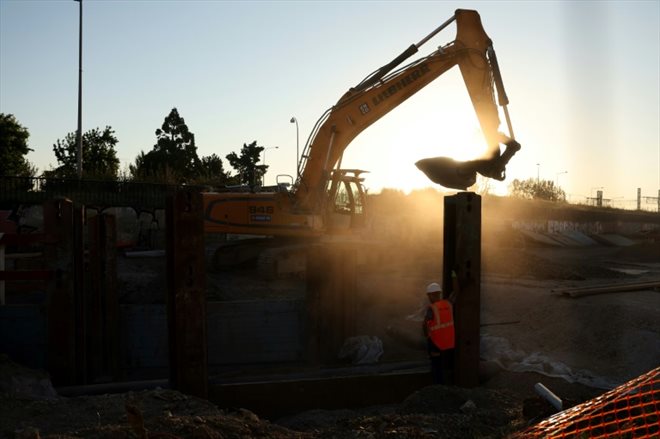With two accidental deaths every day, France remains one of the countries in Europe where the most people die at work. Relatives of victims and specialists on the subject call on public authorities to better enforce safety rules (AFP/Archives/Damien MEYER)
With two accidental deaths every day, France remains one of the countries in Europe where the most people die at work. Relatives of victims and specialists on the subject, however, reject any inevitability, and call on public authorities to better enforce safety rules.
This scourge is not receding: the Minister of Labor, Olivier Dussopt, recently spoke of “a form of floor that we have not been able to cross, around 700 deaths per year”, for more than 15 years.
A poor performer at the level of the European Union, France ranks 4th among the most affected countries, according to Eurostat data for 2021. A ranking to be put into perspective according to Mr. Dussopt, who pleads for harmonization of indicators Between the countries.
The human impact of these tragedies is coupled with a heavy economic impact, for companies, “national solidarity and society as a whole”, points out the government: in 2021, professional accidents caused 51 million days of work. sick leave and more than 2.5 billion euros in benefits paid to victims and beneficiaries.
Hoping to cause an “electric shock”, the ministry recently launched a campaign to call for “corporate responsibility” and “vigilance by all”.
Many tragedies “could have been avoided, if the rules had been respected”, assures Véronique Millot, vice-president of the “Collectif famille: stop death at work”.

A sign posted on July 25, 2021 in front of a construction site at Massy-Palaiseau station, in the Paris region, where an engineer died in the collapse of a drilling well (AFP/Archives/Sameer Al-DOUMY)
– Endangered –
In 2021, Ms. Millot lost her son Alban, who died on his 25th birthday. The young man fell five meters three weeks after being hired by a photovoltaic panel installation company.
“There was no harness, no harness, no scaffolding, no net, just a ladder,” she lists.
Member of the “Angry Rope Rope Workers” collective, Grégory Molina also notes the “failures in organization, training and supervision”, which expose professionals to increased risks.
These situations of “endangerment” by companies are also singled out by labor inspectors interviewed by AFP.
“When we investigate serious and fatal workplace accidents, we collect infractions like leaves in the fall,” says Gérald Le Corre, labor inspector and CGT representative in Rouen, who notes the low level of training on a daily basis. on safety, “unsecured machines and equipment”, or even the absence of “sufficient time to comply with procedures”.
In this area, “the first person responsible is the employer”, underlines Anthony Smith, CGT union leader at the Ministry of Labor and labor inspector.
– “Nailed to the pillory” –
However, with less than 2,000 labor inspectors for 21 million employees in the private sector, “impossible to verify everything”, he laments, noting the meagerness of the “legislative arsenal” to protect employees.

On a construction site in Bordeaux on August 21, 2023 (AFP/Archives/ROMAIN PERROCHEAU)
“It is absolutely unbearable to see business leaders pilloried for so-called underinvestment on this subject,” replies, however, on the employers’ side, Eric Chevée, vice-president in charge of social affairs at the Confederation. small and medium-sized enterprises (CPME).
On the contrary, workplace accidents are “a permanent concern for business leaders”, who also incur “their civil and criminal liability in this matter”, and assume part of the cost of accidents, according to this manager.
For sociologist Danièle Linhart, the worrying persistence of fatal accidents is linked to “the individualization of the world of work”, the “competition” of individuals and the “culture of permanent change”.
“We ask people to achieve increasingly difficult objectives,” analyzes this academic specializing in the evolution of work. This “helps them take risks and go beyond fatigue”.
© 2023 AFP
Did you like this article ? Share it with your friends using the buttons below.




